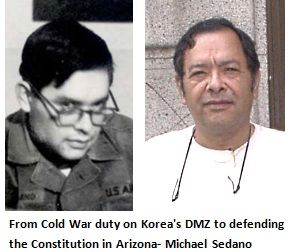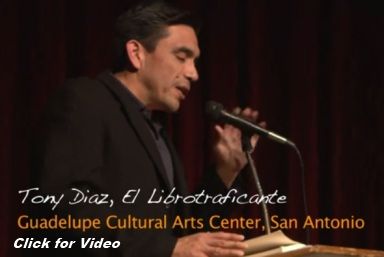| « Legislation to Ban Arsenic in Maryland’s Poultry Industry Derailed Again by Insider Politics | Real Health Care Advocates Should Support Repeal of the Insurance Mandate » |
Books Banned in Arizona - Latinos Fighting Thought Control
By Michael Collins

Bad things are happening in Arizona … again. Good things too!
The extremist Arizona legislature enacted a law that just recently caused the banning of nearly 100 books from Tucson public schools. The list includes prominent Latino authors, plus Shakespeare, Thoreau, and James Baldwin. They even banned Zorro!
The real goal was to totally dismantle the Tucson school district's Mexican American Studies program. Mission accomplished. The program is gone. Not a class survived.
The enabling act, Arizona House Bill 2281, contains some lofty language. It requires that school districts teach students to "value each other as individuals." They cannot be instructed to "hate other races" or "overthrow the United States government." Promoting "resentment toward a race or class of people" or "ethnic solidarity" is forbidden. A bit overdone but it has some potential, right?
The law was just a smokescreen to cover ethnically based attacks on Latinos students in Tucson schools. Neither the banned books nor the dismantled Mexican American Studies program violated any of the provisions listed yet the law banned the books and ended the program.
Wake up call
Preoccupied with other issues, I'd missed this critical event until this weekend. A close friend since college, Michael Sedano, sent me this cryptic message: check out my latest adventures. My friend is part of the Librotraficante Caravan, or "book smugglers caravan," as Mike calls it. Latinos authors and others opened underground libraries in Arizona and environs. These enclaves of literacy offer the banned books to Latino students, no special permits required.
I first met Sedano in college back in the day. Aside from his many other fine qualities, I enjoyed a special benefit from hanging out with him. His literary taste was (and is) impeccable. He introduced me to Joyce, Samuel Beckett, William Burroughs, even Edgar Rice Burroughs. A few years ago, he helped start La Bloga, an online salon for leading Latino authors. Before that, he launched Read! Raza -- a program and web site that promotes reading and oral readings of Latino literature for K-12 students.
It makes perfect sense that my good friend hit the road with a stash of contraband literature headed for underground libraries. He's serving fellow Latinos and, in doing so, he and his literary comrades defend the rights of all of us to freely read, discuss, and think about our culture, history, and future.
But what's wrong with Arizona legislature and the state superintendent of schools who implemented this dreadful edict?

They shoot judges, don't they?
Federal judge John Roll of Arizona was shot dead in Tucson, Arizona at the same 2011 shooting that targeted Representative Gabrielle Giffords. Roll, a Bush appointee, became the target of anti-Latino racism when he simply allowed a lawsuit to go forward brought by undocumented workers against a prominent rancher. After the ruling, Roll was subject to filthy invective and death threats day after day by phone and email. In one afternoon, his office received 200 hostile calls
The attack on Judge Roll reflect the constituency behind the Arizona law that bans books and axes academic programs that serve a community (Tucson schools are 60% Latino). It never occurred to them that their acts caused harm and directly opposed to a long legal tradition against the formal censorship of ideas and books (with the exception of sexual "obscenity"). This applies to schools as well. In the landmark decision on the issue, the Supreme Court of the United States ruled:
"First Amendment rights are available to teachers and students, subject to application in light of the special characteristics of the school environment.
"A prohibition against expression of opinion, without any evidence that the rule is necessary to avoid substantial interference with school discipline or the rights of others, is not permissible under the First and Fourteenth Amendments." Tinker v. Des Moines Sch. Dist., November 12, 1968
Arizona's political rulers not only failed to read the Constitution, they ignored an independent curriculum audit of Tucson's Mexican American Studies program. The Cambrium Learning, Inc. audit found "no evidence" that the Tucson Mexican American Studies program violated any provisions of the Arizona law.
Fighting for the right to read, think, and speak freely
Latinos from California to Texas are fighting back. They formed Librotraficante (book trafficker) and established underground libraries that stock the banned books. The effort, called "operation wetbook," is up and running in Tucson, Albuquerque, San Antonio, and Houston. Novelist and entrepreneur Tony Diaz, founder of Librotraficante summed up the resistance to Arizona's latest attack on Latinos:
"When Arizona decided to rewrite history, we decided to make more … by banning, by prohibiting Latino studies [the Arizona legislature] created what they feared the most. We're not the sleeping giant. We're the working giant and reporting for work right now and from now on." Tony Diaz, Novelist

Ultimately, knowledge is power. Reading, talking, sharing thoughts, and debate provide the path to knowledge. Who would stand in the way? Who would stop such an effort?
As Michael Sedano said on day five of his travels for Libro Traficantes:
"Los Libro Traficantes, acting as a living, flesh-and-blood prosthesis for the United States cultural mind, liberated the banned books by leaving a trail of banned book libraries in their wake as they caravanned from Houston to San Antonio to El Paso to Mesilla to Albuquerque to Tucson." Michael Sedano, On the Road for Banned Books, March 17
END
This article may be reproduced with attribution of authorship and a link to this article.
Also see:
Librotraficante website
Donations of banned books welcomed at Underground Libraries
On the Road for Banned Books, Michael Sedano: March 13, 14, 15, 16, 17, and 20
“No MAS!”: Inside the Dismantling of Tucson’s Mexican American Studies Program (Part I) and (Part II)
Graduate of Tucson program speaks out - Erin Cain-Hodge


